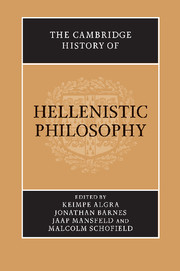Book contents
- Frontmatter
- PART I INTRODUCTION
- PART II LOGIC AND LANGUAGE
- PART III EPISTEMOLOGY
- PART IV PHYSICS AND METAPHYSICS
- 11 Hellenistic physics and metaphysics
- 12 Cosmology
- 13 Theology
- 14 Explanation and causation
- 15 Determinism and indeterminism
- 16 Epicurean psychology
- 17 Stoic psychology
- 18 Philosophy, science and medicine
- PART V ETHICS AND POLITICS
- Synopsis of principal events
- Editions of sources and fragments
- List of abbreviations
- Bibliography
- Index locorum
- General Index
- References
17 - Stoic psychology
from PART IV - PHYSICS AND METAPHYSICS
Published online by Cambridge University Press: 28 March 2008
- Frontmatter
- PART I INTRODUCTION
- PART II LOGIC AND LANGUAGE
- PART III EPISTEMOLOGY
- PART IV PHYSICS AND METAPHYSICS
- 11 Hellenistic physics and metaphysics
- 12 Cosmology
- 13 Theology
- 14 Explanation and causation
- 15 Determinism and indeterminism
- 16 Epicurean psychology
- 17 Stoic psychology
- 18 Philosophy, science and medicine
- PART V ETHICS AND POLITICS
- Synopsis of principal events
- Editions of sources and fragments
- List of abbreviations
- Bibliography
- Index locorum
- General Index
- References
Summary
Introduction
As the previous chapter has shown, Epicurean psychology is physicalist in ways that have some affinity to contemporary use of that explanatory model. The Stoic theory is harder to characterize though no less intriguing so far as scientific and philosophical issues are concerned. Modern western thinkers are likely to find the Stoics to be considerably more sophisticated than the Epicureans in analysing the faculties and subjective content of the mind but less plausible than their rivals in accounting for the mind's ontological foundations. By way of introduction, we may note some striking similarities and differences between the two theories.
Like the Epicureans, the Stoics identify the principle of sentient life with a corporeal psuchē. In both theories the psuchē is distributed throughout the limbs and organs of the animal, whether human or non-human. Like the Epicureans again, they draw a sharp distinction between the human mind (which they call ‘thought’ or the ‘governing part’ of the psuchē), located in the heart, and the rest of the psuchē (the ‘spirit’ in Lucretius’ Epicurean terminology), situated in all the other parts of the body. Ignoring differences of detail concerning the relation between the mind and the rest of the psuchē, we have something broadly analogous in both theories to the modern allocation of functions to the brain and the central nervous system respectively.
The physical constituency of the Stoic psuchē, together with its functional division into governing and instrumental parts, differentiates it sharply from the psychology of Aristotle as well as Plato. However, the Stoics’ similarity in these respects to Epicurus should not be overemphasized.
- Type
- Chapter
- Information
- The Cambridge History of Hellenistic Philosophy , pp. 560 - 584Publisher: Cambridge University PressPrint publication year: 1999
References
- 15
- Cited by



